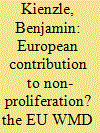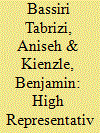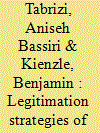|
|
|
Sort Order |
|
|
|
Items / Page
|
|
|
|
|
|
|
| Srl | Item |
| 1 |
ID:
123885


|
|
|
|
|
| Publication |
2013.
|
| Summary/Abstract |
In the aftermath of the ruptures caused by the Iraq crisis, European states agreed in December 2003 on both a European Security Strategy and an EU Strategy against the Proliferation of Weapons of Mass Destruction (WMD).
Ten years have passed since this attempt to kick-start common European policies on WMD proliferation. How well have EU policies performed in this area? Has a specifically European way of dealing with proliferation challenges emerged?
This article traces the development of EU policies on WMD proliferation since 2003 by examining, in particular, European reactions to the nuclear crisis in Iran, as well as European interactions with the international non-proliferation regime and the cooperation with partner countries. The article concludes that the EU has performed much better than might have been expected in an area that has traditionally been one of the fiercely guarded prerogatives of national security policies.
The EU's good performance is very much related to institutional flexibility, as exemplified by the EU/E3 approach to Iran, and to a high degree of political pragmatism. However, important shortcomings remain, most notably the lack of coordination between national and European non-proliferation efforts. In other words, the EU has not in the last 10 years turned into a fully fledged non-proliferation actor that can deliver tangible results in any area of proliferation concern.
|
|
|
|
|
|
|
|
|
|
|
|
|
|
|
|
| 2 |
ID:
137046


|
|
|
|
|
| Summary/Abstract |
Norm challenge is a continuous feature of international norms. However, the dynamics of such a challenge are still not properly understood. Therefore, this article examines in-depth the key processes involved in a major, but still underexplored challenge in the case of the nuclear non-proliferation regime: the recent accommodation of India in the regime, even though it developed nuclear weapons in violation of the regime's fundamental non-proliferation norm. More specifically, it will focus on how certain states came about to support such a norm challenge. In this regard, the European Union and its member states played a crucial role, as they included both very supportive and very reluctant states that all had the opportunity to block India's accommodation in the regime. In contrast to the traditional focus on persuasion and argumentation in the norm-based literature, this article argues that it was the peculiar interplay of persuasion and argumentation with material incentives, pressure, and bargaining that created the support for norm challenge in the early stages, in particular in the case of the states that remained highly sceptical of the challenge.
|
|
|
|
|
|
|
|
|
|
|
|
|
|
|
|
| 3 |
ID:
174569


|
|
|
|
|
| Summary/Abstract |
The negotiations with Iran about its nuclear programme have seen the most protracted involvement of the High Representatives of the European Union in a high-profile policy case. This article traces the evolution of the High Representatives’ participation in the negotiations, from the first contacts with the E3 (Germany, France and the United Kingdom) in 2003 to the adoption of the Joint Comprehensive Plan of Action in 2015. It focuses on the institutional role the High Representatives played in relation with the directoires leading the talks with Iran – first the E3 and, since 2006, E3/EU. In this context, it examines the personal and organisational factors that affected the influence each of the three High Representatives (Javier Solana, Catherine Ashton and Federica Mogherini) had in regard to the directoires. The analysis distinguishes specifically between the phases before and after the 2009 Lisbon Treaty. The article shows how similar personal qualities of the three High Representatives in terms of problem-solving and trust-building gave them political capital that enabled them to adopt a fairly constant role as bridge-builders within the directoires and between the directoires and other actors. The reforms of the Lisbon Treaty had only a minor impact.
|
|
|
|
|
|
|
|
|
|
|
|
|
|
|
|
| 4 |
ID:
174712


|
|
|
|
|
| Summary/Abstract |
The European Union has seen the rise of informal groups of states as an increasingly important governance mechanism within its formal structures. Such groups can make decision-making processes more efficient, but they also suffer from a substantial lack of legitimacy in the eyes of the non-members. In this article, we examine how informal groups overcome this fundamental dilemma between efficiency and legitimacy and sustain themselves at the forefront of important policy areas. To this end, we trace the development of what we argue to be a particularly useful case: the E3 directoire in the nuclear negotiations with Iran. The empirical results point to new insights into how directoires – and informal groups in general – can use different types of legitimation strategies to gain and maintain legitimacy. More specifically, the E3 implemented three successive legitimation strategies – detachment, co-optation and integration – using different types of legitimacy sources, in particular problem-solving, institutional adjustments and fostering institutional and policy congruence.
|
|
|
|
|
|
|
|
|
|
|
|
|
|
|
|
| 5 |
ID:
123264


|
|
|
|
|
| Publication |
2013.
|
| Summary/Abstract |
This article examines how cognitive and normative ideas influence the ability of the European Union (EU) to formulate common policies in response to international crises such as the 2002-2003 Iraq crisis and the Iranian nuclear crisis (since 2002). It argues that in crisis situations, i.e. in highly uncertain circumstances, ideas often become the principal guide for policy-makers. More specifically, ideas foster interpretations of a crisis along several core themes: above all, how the crisis issue is perceived, which means are deemed to be legitimate and/or effective and, depending on the particular crisis, how other relevant themes are seen, e.g. the appropriate relationship with the United States. Thus, the formulation of common EU crisis response depends on the convergence of these interpretations in Member States - as in the Iran crisis. On the contrary, if Member States' interpretations diverge beyond a common 'ideational space' - as in the case of Iraq - dissonance will be the probable outcome.
|
|
|
|
|
|
|
|
|
|
|
|
|
|
|
|
|
|
|
|
|